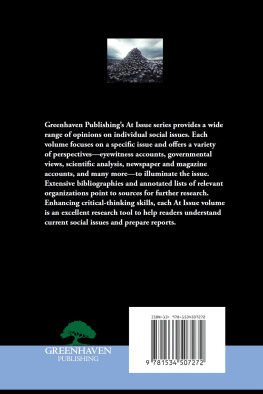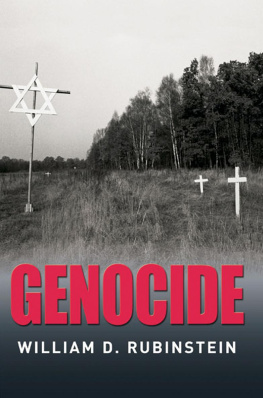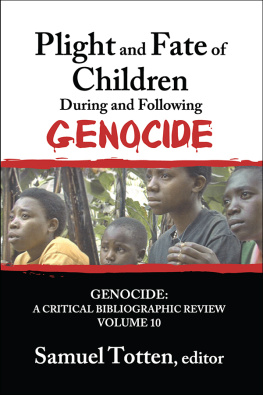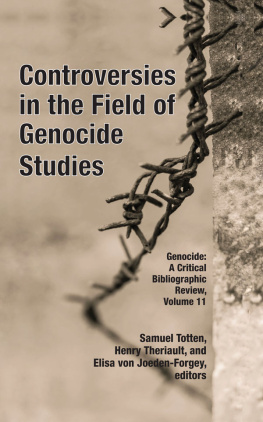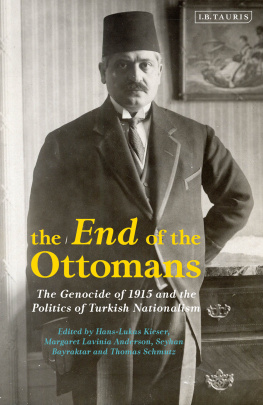L ET T HEM N OT R ETURN
War and Genocide
General Editors: Omer Bartov, Brown University; A. Dirk Moses, University of Sydney
In recent years there has been a growing interest in the study of war and genocide, not from a traditional military history perspective, but within the framework of social and cultural history. This series offers a forum for scholarly works that reflect these new approaches.
The Berghahn series Studies on War and Genocide has immeasurably enriched the English-language scholarship available to scholars and students of genocide and, in particular, the Holocaust.Totalitarian Movements and Political Religions
For a full volume listing, please see back matter
L ET T HEM N OT R ETURN
Sayfo The Genocide against the Assyrian, Syriac and Chaldean Christians in the Ottoman Empire
Edited by David Gaunt, Naures Atto and Soner O. Barthoma

Published in 2017 by
Berghahn Books
www.berghahnbooks.com
2017 David Gaunt, Naures Atto and Soner O. Barthoma
All rights reserved. Except for the quotation of short passages for the purposes of criticism and review, no part of this book may be reproduced in any form or by any means, electronic or mechanical, including photocopying, recording, or any information storage and retrieval system now known or to be invented, without written permission of the publisher.
Library of Congress Cataloging-in-Publication Data
A C.I.P. cataloging record is available from the Library of Congress
British Library Cataloguing in Publication Data
A catalogue record for this book is available from the British Library
ISBN 978-1-78533-498-6 hardback
ISBN 978-1-78533-499-3 ebook
C ONTENTS

David Gaunt, Naures Atto and Soner O. Barthoma
Ugur mit ngr
David Gaunt
Florence Hellot-Bellier
Jan J. van Ginkel
Naures Atto and Soner O. Barthoma
Shabo Talay
Sebastian Brock
Simon Birol
nver A. Cetrez
Racho Donef
Abdulmesih BarAbraham
Christophe Premat
P REFACE

T his book appears in a political atmosphere in which great parts of the Middle East have been set alight, where massacres and ethnic and religious cleansing have become part of our daily lives and indigenous minorities that were the target of massacres and ethnic cleansing in the Ottoman Empire during the First World War are again faced with extinction. In their demonstrations worldwide, Assyrians are appealing to the international community to put an end to the ongoing genocide; they have been holding placards on which is written 1915, 1933, now 2014: No more genocide! referring to the genocidal events in the last century and today. The year 2015 marked the centenary of the genocide during the First World War in Ottoman Turkey. Assyrians refer to this genocide as the year of the sword (i Shato du Sayfo). In a broader context it is more commonly known as the Assyrian genocide, which took place in the borderlands between Turkey, Iran and present-day Iraq and decimated an indigenous population with a unique ethno-religious heritage. Hundreds of thousands were murdered or driven into exile with survivors scattered all over the world. Today they are greatly dispersed in a worldwide diaspora, with large populations in the United States, Europe and Australia, and in the Middle East in Iraq and Lebanon, with only tiny remnants of once vibrant communities in Turkey, Syria and Iran. Although it happened a century ago, among the descendants of its victims and survivors the genocide is still a living trauma. The denial of this genocide, the continued oppression of the Assyrians and their recent expulsion from their ancestral homeland have all served to trigger the remembrance of this traumatic past.
This book is a result of the international research project, An Intergenerational Approach to the Study of Genocide: Seyfo, organized in the Netherlands by the Inanna Foundation in 2011. The impetus for this book stemmed from a shared conviction among its contributors that there are many issues regarding the Assyrian genocide that have not been dealt with or that still require further investigation. Although the genocide of Ottoman Armenians, Assyrians and Pontic Greeks took place in the same time frame and in the same political context, most of the academic publications that have hitherto appeared discuss only the Armenian genocide. So far, existing literature about the Assyrian genocide has been composed principally of a few monographs and articles mainly by historians. Therefore, the primary aim of this volume is to fill the gap in academic research about the Assyrian genocide and develop a greater interest in the Sayfo among scholars. This work is the first academic anthology dealing specifically with the Sayfo. The book aims to provide an interdisciplinary account of the study of the Sayfo by bringing together scholars from history, philosophy, anthropology, linguistics, theology, political science and law in order to open up new avenues of research to the study of this less-researched genocide. We believe that the volume will be an important contribution to comparative genocide studies.
Naming
In this volume, the reader will notice the use of various names for the group(s) discussed in this study. Some of the writers apply the cross-denominational term Assyrian or Syriac to denote what can be seen as an ethnic group originally from Anatolia and Mesopotamia who adhere to several indigenous Christian churches. Other authors use a cross- denominational name when referring to the victim group(s) in general terms, as well as their use of the church name when discussing specific experiences. Yet other authors might use only confessional names. In all cases authors have made it clear in their specific chapters how they refer to the group(s) concerned.
This multiple naming is the result of a historical condition arising from the millet system of the Ottoman Empire in which the formal status of the Assyrians was that of separate church communities and not an ethno-national group. The national awakening of Assyrians came about in the late Ottoman period but rapidly collapsed as, in the period before and during the First World War, their intellectuals were among the first to be killed. Only after the relocation of large numbers of the The name Chaldean has also been used to indicate a community when referring to both a religious and an ethnic group. The use of the respective names Assyrians and Arameans reflects a particular (perceived) ancient ancestry. Many who use the name Arameans focus on a more religious identity and stress the importance of their collective identity after their conversion to Christianity. Hence they also use either the name Syriac or Aramean interchangeably; the latter highlights a more ethno-national identity. In this context, the present-day use of Arameans has been developed in opposition to the use and identification as Assyrians which has a more political and secular orientation. Despite the heated dispute over what name to use when translating the emic name Suryoye/Suryaye into Western languages, all sides suffered from the Sayfo and request recognition of it as a genocide from the international community.
Next page

